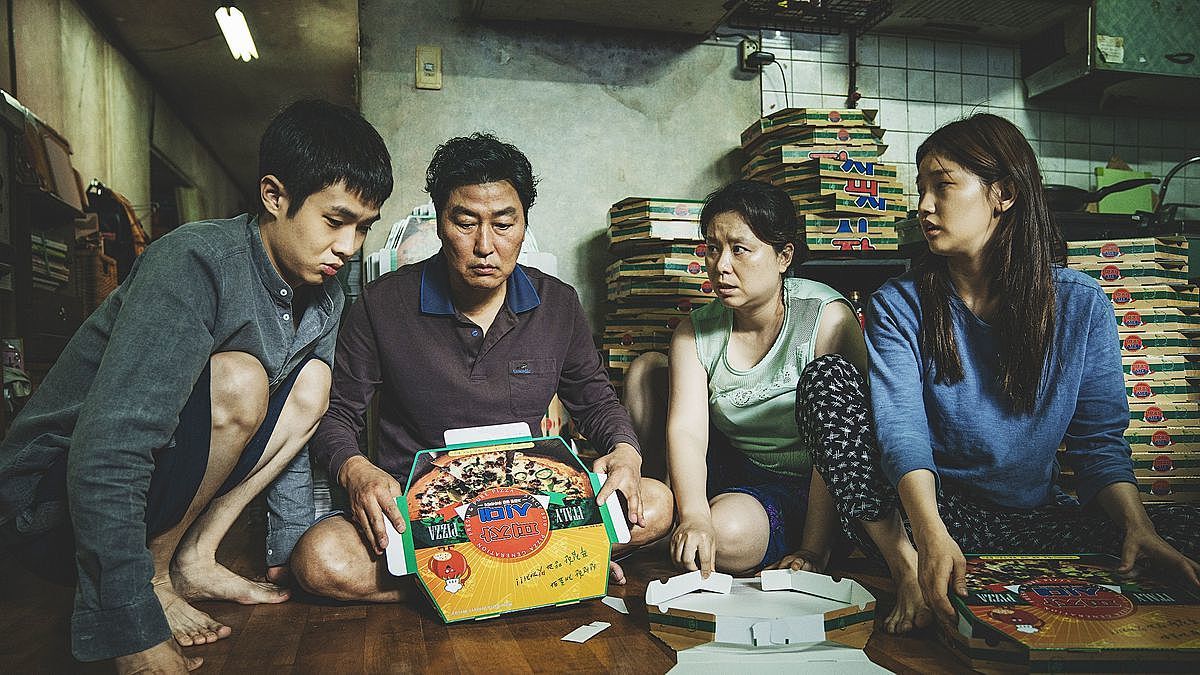How to Win the Palme d’Or: A Review of Parasite
The best film of the season might be one that’s not even in the NZIFF. What makes a horror comedy spectacular enough to win big internationally? Van Mei reviews.
The best film of the season might be one that’s not even in the New Zealand International Film Festival. What makes a horror comedy spectacular enough to win big at Cannes?
Parasites are organisms that live on or in other species. They recall tiny feral micro-critters barely kept at bay by Dettol; alien life-forms feeding on nutrients at their host’s expense; green Matrix virus codes. Bong Joon-ho’s critical hit of the same name speaks less to gut-living tapeworms and more to social piggybacking: how class inequality creates the perfect petri dish for violence, horror and impostor anxiety.
Parasite is premised around the lives of members of a poor family that assimilate into the surroundings of elite Korean affluence. Ki-woo (Choi Woo-shik) gets a break from the grinding routine of poverty by taking over the tutelage of the high-school-student daughter of the wealthy Park family. He fakes his documents and perfects his English to secure the gig, in order to support his out-of-luck parents. The short-changed Kim family soon hatch a wily and hilarious endeavour to securely embed themselves into the upper class, feeding off their pay cheques. But they can’t quite get rid of the stench of being poor. Ultimately, the family struggles to maintain their symbiosis with the Park family when the roles they inhabit start weighing them down like stone.
I walked into the screening of this film with trepidation. I’d heard great things but (full disclosure) I am terrified of horror movies. Anything that is recommended to me comes with the risk of being a total disappointment, and anything that sounds remotely like a haunted xylophone has me running queasily out the door. After popping 50mg of Sertraline down with a full glass of wine, I felt ready to embrace the full drama-horror-comedy value of this film. I’m glad I did.
Parasite is exceptional. It’s tense and beautiful, like the eerie calm after a bout of anxiety. It’s tenderly crafted and very, very funny. The director and team (the same minds behind Okja and Snowpiercer) have no trouble with capturing striking imagery. There are images that stay burned in my retina like flashes of lightning, depicting gritty struggles against sublime settings. There’s the grim beauty of a river coursing through the poorest quarters of a city, small human bodies clinging to drifting household objects. There’s a family observing a drunk man pissing in the warm yellow streetlight, as if watching a melodrama on a grainy TV. There’s the Parks’ youngest son out in the yard, playing with a torch late at night. It flashes like moonlight, or like a roving security guard. In another scene, blood and cake icing melt together in the morning dew.
Across all of these moments, there’s a sense of opposition and unease that teases and toys with you. Reality always shows up gently off-kilter. In one scene, sister Ki-jeong (Park So-dam) elegantly lights a cigarette like an aristocrat as she straddles the lid of a toilet flooded with faeces. Meanwhile the wealthy Park family matriarch, Yeon-kyo (Jo Yeo-jeong) is introduced to us lying face down on a table in the garden, her body splayed and lifeless as her house thrums with activity. To watch her completely asleep and vulnerable in the afternoon sun is to know the trust she holds in her environment, naive to the ambition of intruders.
Not to spoil the film, but there are secrets kept behind the plum jars that threaten to upturn the Kims’ new-found living situation. With the constant threat of being outed as impostors, the Kim family have a firm agenda to keep that shit hidden. This takes our protagonists’ stakes to monumental extremes.
The film successfully celebrates the marriage of oppositional genres. It pairs the visual tropes of horror (winding stairs and hallways, blood splatters, dissonant minor chords) with the surprises of comedy (deadpan characters, clever dialogue, disguised identities). In doing so, Parasite is able to balance its farcical heights with the grounding of real sociopolitical commentary, creating something that is both entertainingly unlikely and deeply emotionally gripping. We’re committed to the moment-by-moment tension of the Kim family’s desperate attempts to keep the wheels turning.
I found similarity in this film to the previous Palme d’Or winner Shoplifters, by Hirokazu Kore-eda. Both protagonist families live in precarity, but are welded together by a sense of shared joy and unity, because and in spite of their situation. Small luxuries, like sunlight filtering through a yard or a glimpse of fireworks, are taken as incomparably precious moments – the characters are wary enough about the temperamental nature of luck not to waste their time agonising over good fortune. As members of their respective low-income households, each person also knows how to secure their value, finding ways to become advantageously useful, skilful and good-humoured. Even when they get into deeply troubled waters, there is little blame cast between one another. Value is held instead in a person’s ability to defy the odds and swim successfully against the current. It’s not uncommon for responsibilities of parents and children to be equal, the family unit bound together by survival as much as by love and biology.
The consequences that affect these family members highlight the stark ramifications of poverty. In Shoplifters, the threat of being caught by a routine check from a shop owner or a neighbour is deadly: an entire fragile ecosystem could be upturned. In Parasite, torrential rain means that the Park family’s anticipated holiday must be curtailed; for the poor Kims, this means spending a sleepless night seeking shelter in a gym amongst hundreds of other temporary refugees.
The film muses on the effects of inequality on our own behaviours, told not as a Brother’s Grimm fairy tale with foreboding church bells, but by weaving our own desires into the Kim family’s personal agendas. Much like the Kims, we all desire to belong, be seen and be respected by one another – though wanting something always risks the cost of receiving it. We are cautioned to be wary of the impulse to shed our identities and outrun our circumstances. Simultaneously, we are warned against surrendering to a defeatist attitude that things will forever remain the same.
Parasite came out just a few weeks ahead of the New Zealand International Film Festival. I was surprised to discover that it wasn’t programmed within the festival, but that’s timing for you – the film’s distributors obviously didn’t want to risk waiting. I wonder whether, outside of the NZIFF, avid movie-going audiences will actively seek out Parasite. I hope they do. Its critical reception at Cannes and the strong word-of-mouth factor have powerful gravity, but I worry that it will get overlooked as simply a scary movie, or relegated as a foreign-language film to boutique screens, lost in the battle of the box office.
There’s only a smattering of English spoken in the film, and all the dishes and dialects are delightfully Korean. While the context of the story feel less translatable to our own backyard – tensions between North and South Korea play a part here – its joys and class struggles are universal. Strong actors flesh out the morally complex lives of our characters to achieve a reality as absurd as life. I watched this film as part of a Pan Asian Screen Collective screening, and the laughter filling the room told me how special it is to see Asian characters being given the full breadth and context of their lives – to see Asia not as a wistfully romanticised holiday destination but as a very real place. It’s refreshing to watch a film miles away from its home audience and yet feel totally engaged in drama that is both otherworldly and ordinary. For us parasites, if we are parasites, the hope of survival can sustain us beyond circumstances we could not imagine tolerating.

